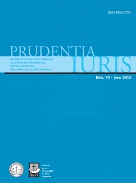Please use this identifier to cite or link to this item:
https://repositorio.uca.edu.ar/handle/123456789/2796| DC Field | Value | Language |
|---|---|---|
| dc.contributor.author | Serrano Redonnet, Diego M. | es |
| dc.date.accessioned | 2019-05-23T13:10:13Z | - |
| dc.date.available | 2019-05-23T13:10:13Z | - |
| dc.date.issued | 2012 | - |
| dc.identifier.citation | Serrano Redonnet, D. M. Liberalismo, neutralidad estatal y perfeccionismo : Rawls y su crítica [en línea], Prudentia Iuris. 2012, 73. Disponible en: https://repositorio.uca.edu.ar/handle/123456789/2796 | es |
| dc.identifier.issn | 0326-2774 | - |
| dc.identifier.uri | https://repositorio.uca.edu.ar/handle/123456789/2796 | - |
| dc.description.abstract | Resumen: Este artículo expone ciertos ejes del debate contemporáneo en torno al liberalismo político y la neutralidad estatal para intentar una recapitulación crítica que permita arrojar luz sobre la posibilidad de una posición que concilie el respeto a la pluralidad contemporánea y a ciertos principios constitucionales con la no abdicación del rol que la política debe tener en el fomento de la “vida buena” (lo que en la tradición de la filosofía política anglosajona se ha designado como “perfeccionismo”). El artículo explora, al menos preliminarmente, sobre qué premisas se asentaría dicha conciliación, a través del análisis de la justificación del “perfeccionismo” y del tratamiento del tema del paternalismo estatal, la coerción y el fomento. Se analizan las ideas de Rawls así como las de algunos de sus críticos, en especial de Sandel y – sobre todo– de Raz, dado que es un autor que abre las puertas a la posibilidad de un liberalismo “perfeccionista”, fiel a los principios del liberalismo político clásico, pero que abandona la exigencia de “neutralidad” ante distintas concepciones del bien. | es |
| dc.description.abstract | Abstract: This article describes the key elements of the current debate regarding political liberalism and state neutrality with a view towards attempting a critical evaluation that sheds light on the possibility of a position that reconciles respect to modern pluralism and certain constitutional principles with the role that politics should have in the fostering of a “good life”, in other words, with the so-called “perfectionism”. The article explores, on a preliminary basis, under which premises such reconciliation could be achieved, through the analysis of the justification of “perfectionism” and the consideration of the issue of state paternalism, coercion and promotion. The ideas of Rawls are considered, as well as the thought of some of his critics, like Sandel and, particularly, Raz, because it is an author that opens the door to the possibility of a “perfectionist” liberalism, faithful to the principles of classical political liberalism while at the same time untied to the requirement of “neutrality” towards different conceptions of the good. | es |
| dc.format | application/pdf | es |
| dc.language.iso | spa | es |
| dc.publisher | EDUCA | es |
| dc.rights | Acceso Abierto | es |
| dc.rights.uri | https://creativecommons.org/licenses/by-nc-sa/4.0/ | es |
| dc.source | ISSN 0326-2774 | es |
| dc.subject | Rawls, John, 1921-2002 | es |
| dc.subject | LIBERALISMO | es |
| dc.subject | FILOSOFIA POLITICA | es |
| dc.subject | PLURALISMO | es |
| dc.subject | NEUTRALIDAD | es |
| dc.subject | PERFECCIONISMO | es |
| dc.title | Liberalismo, neutralidad estatal y perfeccionismo : Rawls y su crítica | es |
| dc.type | Artículo | es |
| uca.path | Prudentia Iuris|2012 nº 73 | es |
| uca.disciplina | DERECHO | es |
| uca.filename | /home/data-uca-generic/folder_generic/Revistas de la Universidad/prudentia/73/liberalismo-neutralidad-estatal-rawls/metadata.xml | es |
| uca.issnrd | 1 | es |
| uca.affiliation | Fil: Serrano Redonnet, Diego M. Pontificia Universidad Católica Argentina. Facultad de Derecho; Argentina | es |
| uca.orden | 05 | es |
| uca.version | publishedVersion | es |
| item.fulltext | With Fulltext | - |
| item.grantfulltext | open | - |
| item.languageiso639-1 | es | - |
| Appears in Collections: | PI - 2012 nro. 73 | |
Files in This Item:
| File | Description | Size | Format | |
|---|---|---|---|---|
| liberalismo-neutralidad-estatal-rawls.pdf | 296,92 kB | Adobe PDF |  View/Open |
Page view(s)
1,378
checked on Apr 30, 2024
Download(s)
943
checked on Apr 30, 2024
Google ScholarTM
Check
This item is licensed under a Creative Commons License

